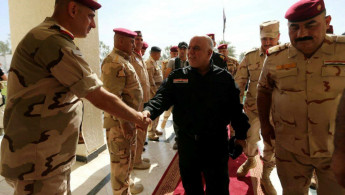Iraq seeks to speed up death penalty for 'terrorists'
Iraq's prime minister is seeking to speed up the implementation of death sentences, his office said on Saturday, despite persistent concerns over flaws in the judicial system that hands them down.
Prime Minister Haider al-Abadi ordered the formation of a committee "to determine the obstacles and causes that result in the delay in the implementation of death sentences," a statement said.
The committee is to make recommendations to "speed up the ratification of those sentences and their implementation," it said.
Iraq has for years faced widespread criticism from diplomats, analysts and human rights groups who have said that, due to a flawed justice system, those being executed are not necessarily guilty of the crimes for which they were sentenced to die.
Following a bombing in Baghdad that killed nearly 300 people earlier this month, the justice ministry announced that five people had been put to death in a statement linking the timing of the executions with the blast.
Member of the Alliance of Iraqi Forces, the main Sunni Arab bloc in parliament, Mohammad al-Mashhadani said that the government's insistence on carrying out the death penalties was for political reasons.
"The government is responding to political pressure it is facing from the ruling National Iraqi Alliance to carry out new executions. The majority of the executions that have been carried out in the past few weeks have targeted Sunnis," Mashhadani told The New Arab.
He added that during the rule of former Prime Minister Nouri al-Maliki hundreds of innocent people were put to death based on false information.
Rights group Amnesty International subsequently repeated calls for a halt to executions in the country, saying that more than 100 had been carried out so far in Iraq this year.
"Amnesty International has repeatedly called on the Iraqi government to halt executions," it said.
"Death sentences are frequently handed out by courts following grossly unfair trials marred by the use of 'confessions' extracted under torture," Amnesty said.
Agencies contributed to this report.





 Follow the Middle East's top stories in English at The New Arab on Google News
Follow the Middle East's top stories in English at The New Arab on Google News
![The UAE is widely suspected of arming the RSF militia [Getty]](/sites/default/files/styles/image_330x185/public/2024-11/GettyImages-472529908.jpg?h=69f2b9d0&itok=Yauw3YTG)
![Netanyahu furiously denounced the ICC [Getty]](/sites/default/files/styles/image_330x185/public/2024-11/GettyImages-2169352575.jpg?h=199d8c1f&itok=-vRiruf5)
![Both Hamas and the Palestinian Authority welcomed the ICC arrest warrants [Getty]](/sites/default/files/styles/image_330x185/public/2024-11/GettyImages-2178351173.jpg?h=199d8c1f&itok=TV858iVg)